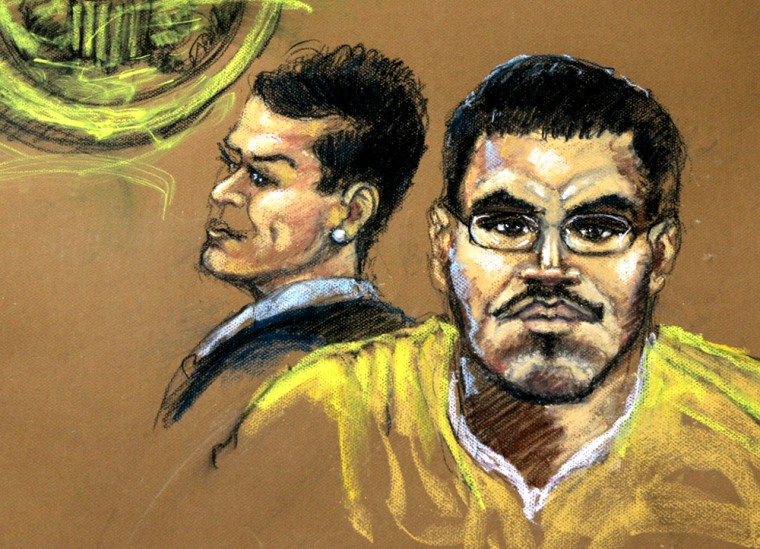Jose Padilla, a U.S. citizen who was held for more than three years as an “enemy combatant,” pleaded not guilty Thursday to criminal charges alleging he was part of a secret network that supported violent Muslim extremists around the world.
The plea, followed by a judge’s refusal to set bail for Padilla, came one week after he was transferred from military to civilian custody.
“Absolutely not guilty,” said Michael Caruso, one of Padilla’s lawyers. Padilla did not speak during the hearing, other than to confirm the pronunciation of his name (puh-DIL-uh).
In denying bail, U.S. Magistrate Judge Barry Garber sided with prosecutors, who said Padilla likely would flee to avoid trial and that the charges — including allegations that he attended an al-Qaida training camp in Afghanistan — made him dangerous.
“How much more dangerous can someone be than someone who attended a terrorist training camp?” prosecutor Stephanie Pell said.
Padilla, 35, was arrested at Chicago’s O’Hare Airport in May 2002 and held at a military brig in South Carolina without criminal charges, initially on suspicion of plotting to detonate a radioactive “dirty bomb” inside the United States.
Case raises legal challenges
His case raised questions about whether U.S. citizens detained on American soil could be held without trial in the name of the war on terrorism.
Before the Supreme Court could decide whether to take up Padilla’s case, the Justice Department presented the case to a civilian grand jury, which indicted him in November. The charges do not involve the “dirty bomb” allegations or claims that he plotted as an al-Qaida operative to blow up apartment buildings in major U.S. cities.
Last week, the high court approved Padilla’s transfer to civilian custody in Miami, overruling a lower court that suggested the administration changed tactics and indicted Padilla to avert a Supreme Court ruling on presidential powers during wartime.
Padilla, a former Chicago gang member and Muslim convert, is charged with conspiring to murder U.S. nationals and providing material support to terrorists as part of a North American cell that provided money, material and fighters for violent Islamic jihad. If convicted, he could face a life sentence.
Prosecutors provided a lengthy list of previous violent charges brought against Padilla, saying he did time for his involvement in a murder when he was 15 and was convicted of crimes including assault, drug possession and weapons violations.
Dispute over long delay in charges
Caruso questioned the strength of the government’s case and whether enough evidence exists that Padilla actually sought to take part in armed jihad. He also said Padilla should not be held for months in solitary confinement after his isolation as a combatant.
“His confinement went far beyond what any American citizen has ever had to endure without charges being filed against them,” Caruso said.
The plea marks Padilla’s first formal answer to any government charge associated with terrorists. His lawyers fought for three years to gain access to the federal courts.
Padilla, who lived for a time in Broward County in the 1990s, is charged in the Florida case along with four others.
They are Adham Amin Hassoun, a Lebanese-born Palestinian who worked as a computer programmer in Broward County; Kifah Wael Jayyousi, Jordanian-born U.S. citizen who worked as a school administrator in Detroit and Washington, D.C.; Mohamed Hesham Youssef, an alleged terror recruit current held in Egypt; and Kassem Daher, a Canadian who is believed to be overseas.
